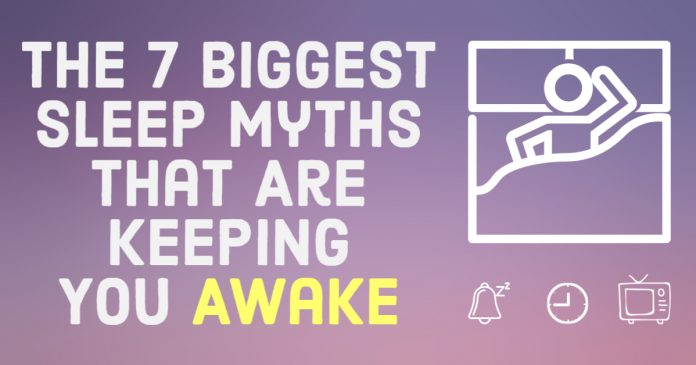Many of us know sleep is important but many of us don’t know how critical sleep is to our bodily, mental, and emotional health, but there is a lot of conflicting advice and confusion out there about what helps or doesn’t help, what’s good or isn’t good. Here are the 7 biggest sleep myths debunked by sleep experts. We hope by understanding what the most common sleep myths are you will be able to set yourself up for a better night’s sleep. In a wide ranging study on the biggest sleep myths, Science Direct found that many of evidence for most common sleep myths is almost non-existent and more awareness on the dangers of bad sleep is needed. So let’s start here with the…
… 7 Biggest Sleep Myths That Are Keeping You Awake At Night
- If you can’t sleep, you should stay in bed and try to fall asleep.
By laying there and tossing and turning and stressing out that you aren’t sleeping, your blood pressure is likely to go up and you will in turn feel more anxious and stressed, and this won’t help you sleep. The best thing is just to try and relax, maybe read a book (with a dim light!) to make yourself sleepy or try and meditate a bit. If you can’t sleep and it’s stressing you out, it’s better to get up for a little while and do something else so you don’t start to associate the bed with a stressful situation. The bed should always be a comfy, inviting place you can’t wait to get into.
2. Many adults only need 5 hours of sleep or less.
A lot of people claim to only require small amounts of sleep, but is 5 hours of sleep per night safe? Data from many sleep labs has repeatedly shown that in fact the overwhelming majority of adults need 7-8 hours of sleep per night. In our culture not sleeping much is worn as a badge of honour, people brag about how little sleep they need or got. While you might be able to SURVIVE for a while on less sleep, you certainly won’t THRIVE. Lack of sleep results in mental decline, increased mental disorders such as anxiety and depression, increase in accidents as well as weight gain and a whole host of other health issues.
3. It doesn’t matter what time you go to sleep.
We have a biological clock which knows when is daytime and when is nighttime. While we can artificially try and fool it by using bright lights at night and blackout curtains in the day, our health will decline from fighting with our circadian rhythm. Studies have been conducted on night shift workers and there are higher levels of heart disease as well as weight gain in those who don’t sleep at night.
4. Loud snoring is annoying but mostly harmless.
Snoring is a sign that there is a blockage in your throat, and the louder the snoring likely the bigger the blockage. Loud snoring can be a sign of sleep apnea which can cause choking and trouble breathing. It also can be a side effect of certain drugs or a result of weight gain. If you suddenly start snoring, it’s worth checking in with your doctor. Also, if you have a partner, their quality of sleep likely has declined too.
5. Hitting Snooze is better than getting up right away.
That extra bit of sleep you get between hitting snooze 5 times is very light and not very restful. It is best to try and go to bed at a time that allows you 8 hours of sleep and then set your alarm and get up when it goes off. If you’re getting enough sleep, ideally you should be waking up naturally around then anyway or at least shouldn’t be too exhausted when your alarm goes off.
6. You can catch up on sleep during the weekends.
We act like sleeping in on the weekends is a luxury because we aren’t getting enough sleep during the week. What happens when we sleep in is we send a cue to our circadian rhythm that we’re trying to switch time zones. When you do that, you end up fighting with your physiology the next night and have even more trouble getting to sleep. If you absolutely are sleep deprived and need a little extra sleep on the weekend you are better off to take a short nap in the afternoon as this will not confuse your circadian rhythm. Ideally though, get a restful, consistent 8 hours each night around the same time and get up around the same time each morning. If you want a little weekend luxury, enjoy your coffee and a book in bed in the morning!
7. Watching TV in bed is a good way to relax.
OK, so I know what you’re thinking? “I already know this!!” So maybe you already know that a TV is a very large source of blue light and can interfere with your circadian rhythm. Your circadian rhythm gets signals from the outside environment, most importantly, light, in order to tell your brain if it’s daytime or nighttime. Blue light therapy used in the morning can be a very useful way to stay alert and improve mood, especially in the darker months of winter. In the evening however, it is best to keep your surroundings as dim as possible so your brain knows it’s time to sleep soon. If you really want to watch something try and do this on a laptop or device where you can control the blue light and shift it to as yellow as possible (many newer devices come with a night shift option). Also best to dim your screen as much as possible. Better yet, read a book under a dim reading light.
Can you think of any other common sleep myths that you have heard? Let us know below and stay tuned for more sleep myths facts coming soon. Best ASMR channels for sleep here.



![5 Underrated ASMR Channels That Should Be HUGE. [Most Underrated ASMRtists on YouTube] Most underrated ASMR channels on YouTube (Best ASMR for sleep)](https://ineedtosleepnow.com/wp-content/uploads/2019/10/Most-underrated-ASMR-channels-on-YouTube-Best-ASMR-for-sleep-218x150.jpg)
![BEST White Noise Machines For Sleep [Best for travel, best value, etc]](https://ineedtosleepnow.com/wp-content/uploads/2019/09/cropped-Best-White-Noise-Machines-Canada-For-Sleep-Top-5-for-2019-1-218x150.jpg)
![The 20 Best Unintentional ASMR Videos To Help You Sleep [The Definitive List]](https://ineedtosleepnow.com/wp-content/uploads/2019/08/cropped-The-Best-Unintentional-ASMR-videos-on-Youtube-to-sleep-to-324x235.jpg)


![ASMR Definition | What EXACTLY is ASMR? [with examples] ASMR definition | What is ASMR? | ASMR defined](https://ineedtosleepnow.com/wp-content/uploads/2019/04/ASMR-definition-ASMR-defined-100x70.jpg)
![What is Unintentional ASMR? [with tons of examples] What is Unintentional ASMR?](https://ineedtosleepnow.com/wp-content/uploads/2019/08/What-is-Unintentional-ASMR-100x70.jpg)